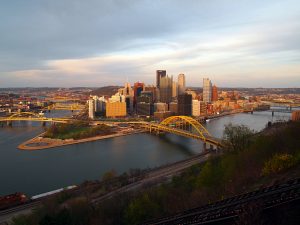By Dave Workman | Senior Editor

Pittsburgh,PA
Pittsburgh residents with support from the National Rifle Association promptly filed a lawsuit against the city after Mayor Bill Peduto signed a package of ordinances that critics claim violates state preemption.
The gun control measures were adopted in response to last October’s attack on the Tree of Life Synagogue that left 11 people dead and another seven wounded.
The three measures outlaw so-called “assault rifles” and “large capacity” magazines, and allow for “red flag” disarmament of people who are considered “extreme risk” threats to themselves or others.
In announcing the lawsuit, Chris Cox, executive director of the NRA’s Institute for Legislative Action, noted, “Restricting law-abiding citizens from exercising their constitutional rights will do nothing to stop violent criminals.”
The synagogue shooting occurred last Oct. 27, and the suspect, Robert G. Bowers, has been charged with dozens of state and federal crimes, some of which reportedly could involve the death penalty.
Pennsylvania has a state preemption statute, and attorney David Thompson, representing the plaintiffs, said the state courts have “repeatedly struck down Pittsburgh ordinances that attempted to regulate firearms in defiance of state law, and we are confident that this latest ordinance will meet the same fate.”
Under the new regulations, magazine capacity is limited to ten rounds, even though handguns used commonly by private citizens and police typically carry more ammunition, depending upon the caliber.
A third measure is aimed at temporarily disarming people considered a risk to themselves or others. Such laws are generically dubbed “red flag” or “Extreme Risk Protection Orders” (ERPO) and they have been at the center of a heating controversy.
Recently, the Second Amendment Foundation warned that such measures must provide for due process. SAF founder and Executive Vice President Alan Gottlieb stated, “The Fifth Amendment guarantees that no person shall be deprived of life, liberty, or property without due process of law. Our legal system has endeavored to zealously protect that right. We should expect the same zealous protection of our Second Amendment right to keep and bear arms, because all individual rights are equally important. To violate one right in an effort to trample the other must never be permitted.”
Critics of local ordinances, and even statewide laws that recognize so-called “gun free zones,” contend that none of those restrictions has ever prevented a mass shooting. Mass shootings frequently occur in “gun free zones” such as schools or businesses that post their premises off-limits to even licensed concealed carry. Gun rights advocates say such laws only disarm law-abiding citizens, making them defenseless victims against armed madmen or terrorists.
High-profile mass shootings, while rare, stir emotions and invariably result in pushes for more gun control.
Of the 11 people killed in the October attack, the youngest was 54-year-old David Rosenthal and the oldest was 97-year-old Rose Mallinger. Many people considered the murders in the Jewish house of orship an act of domestic terrorism.
Visit with the SECOND AMENDMENT FOUNDATION
April 26-28
At Booth 5248





